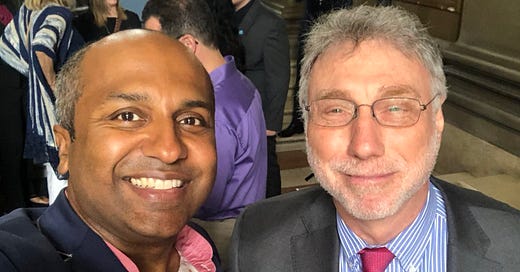In praise of the journalism holding Big Tech accountable
Ryan Mac and Craig Silverman's coverage of Facebook wins a well-deserved Polk Award.
Sree’s newsletter is produced w/ Zach Peterson (@zachprague). That’s a selfie from the Before Times (2018 Pulitzers ceremony) with Marty Baron, the executive editor of the Washington Post, who is retiring today. He’s had one of the most successful runs of any newsroom leader in history. See more in Watch Something below.
Scroll down for Read Something; Watch Something; a weekly tech tip from Robert S. Anthony (@newyorkbob), and much more.
TUNE IN: #NYTReadalong - Our guest this week is Ron Lieber, The New York Times’ Your Money Columnist and Author of "The Price You Pay for College." Here’s executive producer Neil Parekh’s thread on the show.
My Digimentors team is working with companies and nonprofits around the world to create virtual and hybrid events. We’ve worked on events for 50 people and 100,000 people. See our new brochure. Don’t cancel or postpone your conference - contact us! sree@sree.net
***
Holding the powerful accountable is what journalism is all about, and Ryan Mac (@RMac18) and Craig Silverman (@Craigsilverman) have been doing just that on the Facebook beat. This week, the pair was given one of the industry’s top honors, a Polk Award.

Disinformation on Facebook is one of the most important stories of the decade. There have been few things that have shaped the course of the last few years more than Facebook’s rise to ubiquity, and what that has meant for society. Mac and Silverman have been all over it, constantly holding the company to account not just for its own missteps, but also how those missteps are affecting the culture of the company.
This week, they published their latest bombshell about the internal decision-making process around banning a certain conspiracy theory-peddling blowhard whose name I will not use here (deplatforming works, folks). The process was a process - up to a point. Then Mark Zuckerberg stepped in—supported by Facebook VP of global public policy (and conservative lobbyist) Joel Kaplan—and the process ended. There were and are severe societal consequences resting on these decisions that go beyond the short-term damage.
Things like this are the reason good people leave companies like Facebook—and, when that happens, we all lose. The fact is that these companies need more smart, thoughtful people on staff having a voice in policy decisions, not fewer. From the piece:
Since the November vote, at least six Facebook employees have resigned with farewell posts that have called out leadership’s failures to heed its own experts on misinformation and hate speech. Four departing employees explicitly cited the policy organization as an impediment to their work and called for a reorganization so that the public policy team, which oversees lobbying and government relations, and the content policy team, which sets and enforces the platform’s rules, would not both report to Kaplan.
It’s easy to say that it’s been something of a rough last few years for Facebook, but that’s only half of the story. On the business side of things, the company has done quite well. It has a market cap approaching a trillion dollars, and shareholders are probably pretty pleased with these returns:
Facebook’s issues on the public side of things have not led to much in the way of business consequences…yet. But, it’s reporting like that of Ryan and Craig that can change that.
As I’ve written in this space before, I am not out here advocating for Facebook (and its Instagram, WhatsApp, Messenger empire) to fail—quite the opposite. I am still able to find quite a bit of joy on the platform, and I know a lot of people who feel the same. The company has failed to grasp the true nature of its influence and power in our modern information architecture, and it’s made severe mistakes based on that misunderstanding. The only way that can change, and Facebook can become something more akin to a force for good, is by exposing these missteps.
Congratulations to Ryan Mac, Craig Silverman, and Buzzfeed News, for a well-deserved Polk Award.
- Sree
Read Something
The conversation around The Future of Work needs to include everyone. Work from home (WFH) is the new normal, and it will stay that way for a lot of people, but the adjustment means different things to different people. I love this piece by Rachel Bouton on WFH with ADHD—especially the great, practical tips for staying focused (that are good even for folks without ADHD).
Nostalgia Rises as Sun Sets on Fry’s Electronics
By Robert S. Anthony
Each week, veteran tech journalist Robert S. Anthony shares a tech tip you don’t want to miss. Follow him @newyorkbob.
When Fry’s Electronics, an emporium of glittery gadgets for geeks, suddenly closed Feb. 24, it was more than just another economic casualty of the Covid-19 pandemic—it marked a giant step toward the end of an era.
Fry’s stores, located mainly on the West Coast, harkened back to an ancient era (the late 20th century), when many computer users were content to spend weekends building, rehabbing and tweaking their own PCs.
Fry’s was a place where you could peruse long aisles of packed shelves in search of your needed gear and then rub shoulders with fellow geeks as you mulled serious questions of the day—like whether generic floppy disks were as good as the brand-name ones.
When the first Fry’s store opened in 1985, most computer users never bothered to go online. They shared files by exchanging floppy disks (the sneakernet), bought software in (gasp!) boxes and created software by typing in—line by line—BASIC code found in computer magazines (remember those?), which Fry’s also sold.
However, while the desktop PCs of the 1990s required screwdrivers (and sometimes mallets) to configure, today’s sealed mobile electronic devices don’t allow for such tinkering, thus driving down DIY component sales, a significant chunk of Fry’s business.
To separate itself from competitors like CompUSA, RadioShack and Egghead Software, Fry’s tried to make shopping fun: Each store was decorated with a clever theme, like the railroad motif used for its Roseville, Calif., location.
However, as online commerce found its stride, Fry’s stumbled and was late to the game. As other electronics stores disappeared or got smaller, Fry’s remained megasized even as inventory and sales waned.
The demise of Fry’s Electronics says a lot about how we shop today. Instead of touching, feeling and playing with gadgets before we buy them, we’re content to read reviews, eyeball photos, click buttons and wait for delivery.
But with the pandemic hopefully coming to an end soon, could pent-up desire for tactile shopping experiences and real human conversations create a brick-and-mortar electronics store comeback? Doubtful.
While the days of midnight-madness software launches and barrels full of floppies (all you can grab for a fixed price) may be gone for good, as long as there’s room for innovative thinking, there’s always hope.
Watch Something
The Washington Post has completely reinvented itself over the last several years, and Jeff Bezos’s money may be a major part of that, but money only gets you so far. Marty Baron’s (@PostBaron) tenure as Executive Editor was as successful as anyone’s ever had in the news business—and he has a lot say about the state of journalism today. Two senior journalists in two continents conducted exit interviews with Marty: Vivian Schiller of Aspen Digital in a video interview below; and Anand Goenka of Indian Express (“one of the most impactful, meaningful editorships in modern history”). Also worth reading: Marc Tracy’s NYT story about the Baron-Bezos collaboration (“The upshot has been a truly national paper, unmissable not just for inside-the-Beltway scoops but for understanding the country at large.”)


Watch Something II
This is very very powerful. So many people in public life say they are people of God, yet conduct themselves as if they are something quite the opposite—and this is nothing new. Rep. Al Green speaks the truth here, and it’s worth taking his words to heart.


Odds & Ends
🗞 TUNE IN: #NYTReadalong - Our guest this week is Ron Lieber, The New York Times’ Your Money Columnist and Author of "The Price You Pay for College."
The Readalong is followed, on Sundays at 11 am-noon ET, by a new medical show I’m co-executive producing with surgeons Sujana Chandrasekhar, M.D. (@DrSujanaENT), and Marina Kurian, M.D. (@MarinaKurian), called She’s On Call (watch live or later).
After 250 episodes in 250 days, my global show has moved from daily episodes to 1-2 times a week. The best way to know when I’m on the air and see all my archived shows, is to subscribe to my YouTube channel or my Whatsapp alerts.
The Sunday #NYTReadalong is sponsored by Muck Rack. Interested in sponsorship opportunities? Email sree@digimentors.group and neil@digimentors.group.
🎧 Every Saturday, I host a call-in show on WBAI 99.5FM (@wbai) - "Coping with Covid19" - focused on being helpful, hopeful, and focusing on the pandemic's effects on society’s most vulnerable. Listen live Saturdays from 12-1pm ET, or later. And, of course, call in or tweet questions for us using the #wbaisree hashtag. Listen to a recent episode here!
👀 Did we miss anything? Make a mistake? Do you have an idea for anything we’re up to? Let us know! Let’s collaborate!









